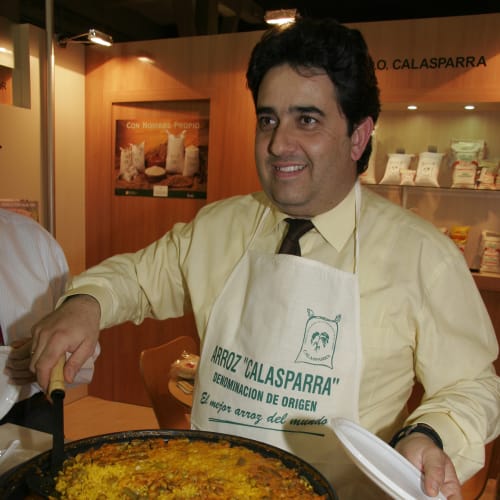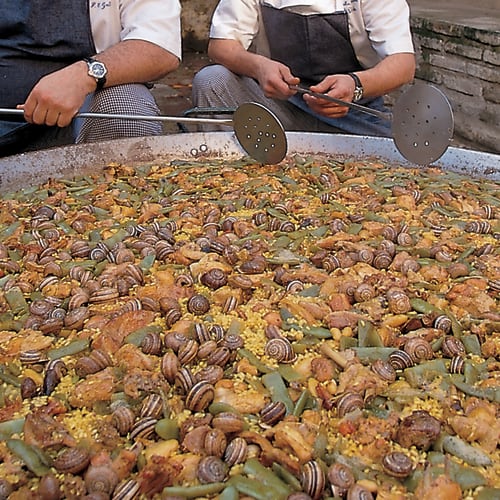The Paella Rice Maestro
June 2006




It is June, and soon in America we will be celebrating Father's Day. In Spain Father's Day is in March, appropriately coinciding with the day set aside for St Joseph. It is a truly significant day, for fatherhood is the linchpin to any spiritually healthy society. Fathers who honor their wives and children, who take responsibility for their protection, and who are willing to serve their family and the community at large are crucial and irreplaceable.
José 'Pepe Ruíz' Egea is just this sort of a paternal figure. I do not mean to imply that he is some sort of saint - he is a regular man: a father of two young daughters, the leader of an association of 160 rice-growers.

Pepe is a man of the countryside of Murcia, with strong rustic features, dancing eyes and a jovial smile. Should you attend any of the major food expositions in Spain, probably you will see him, with a glass of wine in one hand and a spatula in the other presiding over four paellas simmering simultaneously at his cooperative's booth. That is, if there is not a traffic jam in front of his stand.
Before you know it, he will catch your eye and invite you in. Donning a simple apron, made of the same cloth used to bag the cooperative's rice, he will move to the rear where he will scoop out a portion of homemade paella and serve it to you with a warm and generous smile. His favorite is a family recipe made with snails and rabbit. During the time of any fair, perhaps 5,000 people will enjoy paella made by an unassuming paella maestro!
Pepe is happily married and is a proud father of two young daughters, 5 and 9. He was born and raised in Calasparra - the home of his father and of his two grandfathers. Pepe was handpicking rice at the family plot even before he reached school age! When as a young married man he became a rice grower himself, he was following in the footsteps of many generations of his family. This kind of social stability we seldom see in America today.
To the casual visitor the town of Calasparra may appear to be like any other agricultural town - akin to one you might see in the American heartland. It is located in rural Murcia in the southeast part of Spain and consists of a few essential stores: one for hardware and farm necessities, a pharmacy, a small food store and a gasoline station, which has a modest restaurant adjacent to it. My wife Ruth and I visited there several years ago and enjoyed a delicious 'down home' meal. We were eating amidst several local families who made us feel at home.
Calasparra is not merely another farm town, however. For thousands of years the area has hosted many cultures: Neolithic people from the Stone Age, Argars from the Bronze Age, Iberians, Romans, Moors and then Christians since 1412, when the Prior of the Crusader Order of San Juan de Jerusalem granted Calasparra the privilege of settling 50 farmers along the riverside.
It is here that rice-growers cultivate the most celebrated paella rice in Spain. With all the lowland rice paddies that dot the eastern Mediterranean shores, you may wonder how a remote inland mountain town ever got into the business of growing rice. It seems that a couple of centuries ago a malaria-like epidemic became rampant in the renowned Algarve rice fields in Valencia. The amount of deaths was so devastating that in the interests of public health, the government decreed that rice cultivation would have to be relocated outside heavily populated areas.
In search of a remote rural setting suitable for farming, some of the rice-growing families happened upon an exquisite micro-climate a few miles from the XIII Century monastery of Caravaca de la Cruz. The area is 1500 feet above sea level, with readily available mountain water flowing from the Sierra del Puerto Mountains.
Over the years, the rice-growers restored an abandoned Roman aqueduct to feed water from clear mountain streams into the fields below. At first, they followed the traditional four-phase cycle of preparing the land, sowing the seeds, weeding and harvesting, which has been done from time immemorial. However, in order to solve the health problem associated with standing water, they diverted the nourishing mountain streams to flow over a series of descending enclosed terraces or steps, before returning to the main stream. This was quite a departure from the standing water of the Algarve.
An unanticipated consequence was that the rice took much longer to mature, making the grains of rice exceptionally dehydrated - perfect for absorbing high amounts of the rich broth needed to make great paella. Today the Cooperative of Virgin de la Esperanza is one of two sources for this unique paella rice - highly valued for the amount of broth it can absorb without becoming creamy or sticky. With the help of the Cooperative's director José 'Pepe' Ruíz, we are able to package our 'Peregrino' brand Bomba and Calasparra rice - a precious grain unique to one tiny area of the world.
Therefore, we come full circle to Pepe. He is a proud and protective father of two little girls. He comes from a long tradition of rice cultivation. Rice growers are his neighbors and friends. He appreciates the trust the growers have placed in his leadership and is committed to serving them. Nonetheless, I imagine that when most people think of Pepe they picture a warm and generous man with a glass of wine in one hand and a spatula in the other as people crowd around his paellas. He is a man of integrity: he enjoys who he is, and what he and his neighbors contribute to the cuisine of Spain.
Your friend,
Don

